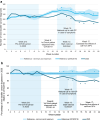The Impact of the COVID-19 Pandemic on Bladder Cancer Care in the Netherlands
- PMID: 38993368
- PMCID: PMC11181832
- DOI: 10.3233/BLC-211608
The Impact of the COVID-19 Pandemic on Bladder Cancer Care in the Netherlands
Abstract
Background: The COVID-19 pandemic has disrupted regular health care with potential consequences for non-COVID diseases like cancer. To ensure continuity of oncological care, guidelines were temporarily adapted.
Objective: To evaluate the impact of the COVID-19 outbreak on bladder cancer care in the Netherlands.
Methods: The number of bladder cancer (BC) diagnoses per month during 2020-2021 was compared to 2018-2019 based on preliminary data from the Netherlands Cancer Registry (NCR). Additionally, detailed data were retrieved from the NCR for the cohort diagnosed between March 1st-May 31st 2020 (first COVID wave) and 2018-2019 (reference cohort). BC diagnoses, changes in age and stage at diagnosis, and time to first-line treatment were compared between both periods. Changes in treatment were evaluated using logistic regression.
Results: During the first COVID wave (week 9-22), the number of BC diagnoses decreased by 14%, corresponding with approximately 300 diagnoses, but increased again in the second half of 2020. The decline was most pronounced from week 13 onwards in patients≥70 years and patients with non-muscle invasive BC. Patients with muscle-invasive disease were less likely to undergo a radical cystectomy (RC) in week 17-22 (OR = 0.62, 95% CI = 0.40-0.97). Shortly after the start of the outbreak, use of neoadjuvant chemotherapy decreased from 34% to 25% but this (non-significant) effect disappeared at the end of April. During the first wave, 5% more RCs were performed compared to previous years. Time from diagnosis to RC became 6 days shorter. Overall, a 7% reduction in RCs was observed in 2020.
Conclusions: The number of BC diagnoses decreased steeply by 14% during the first COVID wave but increased again to pre-COVID levels by the end of 2020 (i.e. 600 diagnoses/month). Treatment-related changes remained limited and followed the adapted guidelines. Surgical volume was not compromised during the first wave. Altogether, the impact of the first COVID-19 outbreak on bladder cancer care in the Netherlands appears to be less pronounced than was reported for other solid tumors, both in the Netherlands and abroad. However, its impact on bladder cancer stage shift and long-term outcomes, as well as later pandemic waves remain so far unexamined.
Keywords: Bladder cancer; COVID-19; disease stage; healthcare; impact; incidence; treatment.
© 2022 – The authors. Published by IOS Press.
Conflict of interest statement
Lambertus A. Kiemeney and J. Alfred Witjes are Editorial Board members of this journal, but were not involved in the peer-review process nor had access to any information regarding its peer-review. Lisa M.C. van Hoogstraten, Richard P. Meijer, Geert J.L.H. van Leenders, Ben G.L. Vanneste, Luca Incrocci, Tineke J. Smilde, Sabine Siesling, Katja K.H. Aben, the BlaZIB study group and the COVID and Cancer-NL consortium declare that they have no conflict of interest.
Figures






Similar articles
-
The impact of the COVID-19 pandemic on renal cancer care.World J Urol. 2024 Apr 13;42(1):231. doi: 10.1007/s00345-024-04925-2. World J Urol. 2024. PMID: 38613582 Free PMC article.
-
Impact of the COVID-19 outbreak on prostate cancer care in the Netherlands.Cancer Treat Res Commun. 2022;31:100553. doi: 10.1016/j.ctarc.2022.100553. Epub 2022 Apr 2. Cancer Treat Res Commun. 2022. PMID: 35421819 Free PMC article.
-
The effect of the time interval between diagnosis of muscle-invasive bladder cancer and radical cystectomy on staging and survival: A Netherlands Cancer Registry analysis.Urol Oncol. 2016 Apr;34(4):166.e1-6. doi: 10.1016/j.urolonc.2015.11.006. Epub 2015 Dec 15. Urol Oncol. 2016. PMID: 26705102
-
European Association of Urology Guidelines on Muscle-invasive and Metastatic Bladder Cancer: Summary of the 2020 Guidelines.Eur Urol. 2021 Jan;79(1):82-104. doi: 10.1016/j.eururo.2020.03.055. Epub 2020 Apr 29. Eur Urol. 2021. PMID: 32360052 Review.
-
Treatment of muscle-invasive and metastatic bladder cancer: update of the EAU guidelines.Eur Urol. 2011 Jun;59(6):1009-18. doi: 10.1016/j.eururo.2011.03.023. Epub 2011 Mar 23. Eur Urol. 2011. PMID: 21454009 Review.
Cited by
-
Intermediate and high-risk non-muscle-invasive bladder cancer: an overview of epidemiology, burden, and unmet needs.Front Oncol. 2023 Jun 2;13:1170124. doi: 10.3389/fonc.2023.1170124. eCollection 2023. Front Oncol. 2023. PMID: 37333804 Free PMC article. Review.
-
The Impact of the COVID-19 Pandemic on Time to Treatment in Surgical Oncology: A National Registry Study in The Netherlands.Cancers (Basel). 2024 Apr 29;16(9):1738. doi: 10.3390/cancers16091738. Cancers (Basel). 2024. PMID: 38730690 Free PMC article.
-
The impact of the COVID-19 pandemic on renal cancer care.World J Urol. 2024 Apr 13;42(1):231. doi: 10.1007/s00345-024-04925-2. World J Urol. 2024. PMID: 38613582 Free PMC article.
-
A Retrospective Analysis of the Challenges of Urothelial Cancer Management during the COVID-19 Pandemic at a Single Academic Center in Romania.Healthcare (Basel). 2023 Mar 9;11(6):812. doi: 10.3390/healthcare11060812. Healthcare (Basel). 2023. PMID: 36981469 Free PMC article.
References
-
- WHO. Timeline: WHO’s COVID-19 response 2021 [25 February 2021]. Available from: https:// https://www.who.int/emergencies/diseases/novel-coronavirus-/interactive-....
-
- RIVM. Februari 2020: Eerste coronabesmetting in Nederland 2021 [25 February 2021]. Available from: https://www.rijksoverheid.nl/onderwerpen/coronavirustijdlijn/februari-20....
-
- RIVM. Maart 2020: Maatregelen tegen verspreiding coronavirus, intelligente lockdown 2021 [25 February 2021]. Available from: https://www.rijksoverheid.nl/onderwerpen/coronavirustijdlijn/maart-2020-....
-
- IKNL. COVID-19 en kanker (COVID-19 and cancer) 2021 [25 February 2021]. Available from: https://iknl.nl/covid-19.
LinkOut - more resources
Full Text Sources
Miscellaneous

